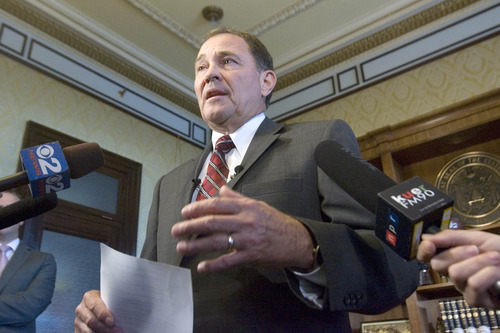This is an archived article that was published on sltrib.com in 2013, and information in the article may be outdated. It is provided only for personal research purposes and may not be reprinted.
The School Institutional Trust Lands Administration answers to no one. And that situation is doing no one in Utah any good.
SITLA's codified mission is to make as much money as possible on lands it oversees, which goes into a trust fund to make even more money, a tiny bit of which goes to fund public education. That single-minded mission, which does not allow SITLA to consider the long-term value of any parcel of institutional trust lands, should be changed by the Utah Legislature.
That need for change — advocated on this page and by others — was re-emphasized last week when SITLA announced it planned to lease parcels of land in the Book Cliffs for oil exploration and drilling.
The 98,000 eastern-Utah acres in question may, indeed, have stores of fossil fuels under the surface, but its greatest sustainable value is to recreationists, particularly hunters. The revenue generated by people visiting the area to hike, fish and hunt doesn't go directly into SITLA's coffers, so, to that body, it doesn't count.
But preserving and managing wildlife habitat brings in millions to state government as well as protecting traditional rights of hunters.
Even Republicans Gov. Gary Herbert and Rep. Rob Bishop, in a move that may have surprised a good many people because of their penchant for supporting ever more drilling on public lands, called upon SITLA to back off its leasing plan in the Book Cliffs. They sided with hunting groups but also rightly pointed out that SITLA's secret dealings with energy developer Anadarko left Utahns who own the land out of the discussion.
Herbert offered a reasonable alternative: that SITLA offer to transfer at least some of that land to the federal government in exchange for parcels elsewhere that would be more suitable for oil exploration and would not ruin the roadless areas prized by those seeking trophy elk.
The trust lands administration refused. It will sign a deal next week with Anadarko to drill the remote area, including scenic wildlife habitat along the Tavaputs Plateau in Grand County.
SITLA's board chairman said, "Clearly the law states that when SITLA lands are involved, the board has no other job than to maximize the value of the trust." And he's correct.
So the law must be changed to make SITLA accountable to Utah citizens who may be interested in more than a quick buck that translates into a few pennies for public education.



